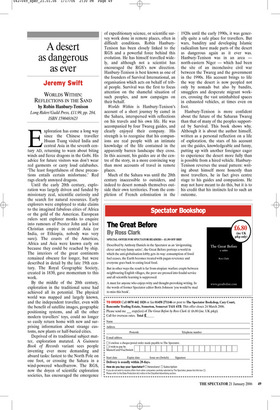A desert as dangerous as ever
Jeremy Swift
WORLDS WITHIN: REFLECTIONS IN THE SAND by Robin Hanbury-Tenison Long Riders’Guild Press, £11.99, pp. 284, ISBN 1590481623 Exploration has come a long way since the Chinese traveller Hsuan Tsang visited India and central Asia in the seventh century AD, returning to warn about biting winds and fierce dragons in the Gobi. His advice for future visitors was don’t wear red garments or carry loud calabashes. ‘The least forgetfulness of these precautions entails certain misfortune.’ Red rags clearly annoyed dragons.
Until the early 20th century, exploration was largely driven and funded by missionary zeal, scientific curiosity and the search for natural resources. Early explorers were employed to stake claims to the imagined fabulous cities of Africa or the gold of the Americas. European rulers sent explorer monks to enquire into rumours of Prester John and a lost Christian empire in central Asia (or India, or Ethiopia, nobody was very sure). The coasts of the Americas, Africa and Asia were known early on because they could be reached by ship. The interiors of the great continents remained obscure for longer, but were described in detail by the late 19th century. The Royal Geographic Society, created in 1830, gave momentum to this work.
By the middle of the 20th century, exploration in the traditional sense had achieved all its potential. The physical world was mapped and largely known, and the independent traveller, even with the benefit of satellite images, geographic positioning systems, and all the other modern travellers’ toys, could no longer so easily return home with new and surprising information about strange customs, new plants or half-buried cities.
Deprived of its traditional subject matter, exploration mutated. A Guinness Book of Records variant sees people inventing ever more demanding and absurd tasks: fastest to the North Pole on one foot, or crossing the Sahara in a wind-powered wheelbarrow. The RGS, now the doyen of scientific exploration societies, has encouraged the emergence of expeditionary science, or scientific survey work done in remote places, often in difficult conditions. Robin HanburyTenison has been closely linked to the RGS and a powerful force behind this evolution. He has himself travelled widely, and although not a scientist has encouraged the RGS’s new direction. Hanbury-Tenison is best known as one of the founders of Survival International, an organisation which acts on behalf of tribal people. Survival was the first to focus attention on the shameful situation of such peoples, and now campaigns on their behalf.
Worlds Within is Hanbury-Tenison’s account of a short journey by camel in the Sahara, interspersed with reflections on his travels and his own life. He was accompanied by four Twareg guides, and clearly enjoyed their company. His strength is to recognise that his companions are real people with an intimate knowledge of the life contained in the apparently barren landscape they cross. In this account, his guides are at the centre of the story, in a more convincing way than most accounts of travel in remote places.
Much of the Sahara was until the 20th century inaccessible to outsiders, and indeed to desert nomads themselves outside their own territories. From the completion of French colonisation in the 1920s until the early 1990s, it was generally quite a safe place for travellers. But wars, banditry and developing Islamic radicalism have made parts of the desert as dangerous again as it ever was. Hanbury-Tenison was in an area north-eastern Niger — which had been the site of an inconclusive civil war between the Twareg and the government in the 1990s. His account brings to life the way the desert is now peopled not only by nomads but also by bandits, smugglers and desperate migrant workers, crossing the vast uninhabited spaces in exhausted vehicles, at times even on foot.
Hanbury-Tenison is more confident about the future of the Saharan Twareg than that of many of the peoples supported by Survival. This book shows why. Although it is about the author himself, written as a personal reflection on a life of exploration, the stars of his account are the guides, knowledgeable and funny, putting up with another foreigner eager to experience the desert more fully than is possible from a hired vehicle. HanburyTenison reverses the usual pattern: writing about himself more honestly than most travellers, he in fact gives centre stage to his guides and companions. He may not have meant to do this, but it is to his credit that his instincts led to such an outcome.



















































 Previous page
Previous page